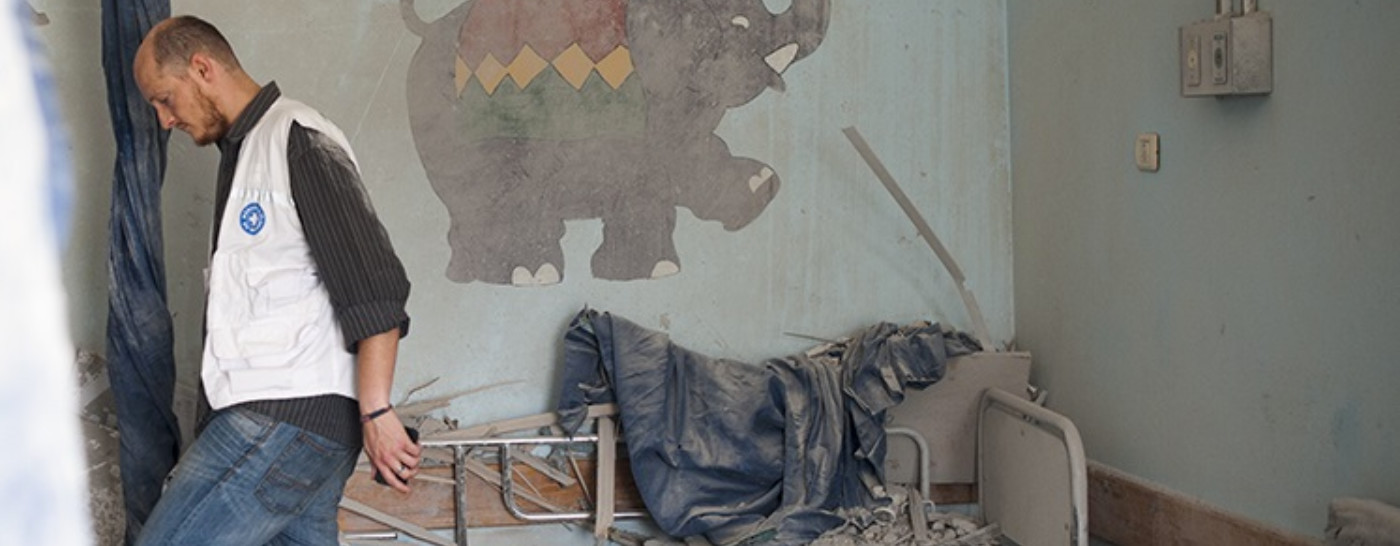Impunity Remains: Attacks on Health Care in 23 Countries in Conflict
Published 23rd May 2019
Washington – There were at least 973 attacks on health workers, health facilities, health transports and patients in 23 countries in conflict in 2018, the Safeguarding Health in Conflict Coalition reported today. At least 167 health workers died and at least 710 were injured. This marks an increase in the number of documented attacks compared to 2017, when the Coalition reported 701 such instances.
The Coalition’s sixth annual report documents attacks on vaccination workers, paramedics, nurses, doctors, midwives, community volunteers, drivers and guards, in violation of international norms and interrupting global efforts to stop dangerous disease outbreaks such as Ebola and eradicate polio.
Evidence of attacks in the report, Impunity Remains: 2018 Attacks on Health Care in 23 Countries in Conflict, was gathered from humanitarian organizations, the World Health Organization and other United Nations (UN) agencies and Coalition members, as well as from open source data.
The report offers accounts of specific attacks, including:
- In Afghanistan in January, a suicide bomber drove an ambulance packed with explosives through a busy checkpoint then detonated a bomb that killed at least 95 bystanders.
- In February, 13 Médecins Sans Frontières International-supported hospitals and clinics in East Ghouta, Syria, were hit by bombs or shells.
- In March in the northern Nigerian state of Borno, Boko Haram insurgents armed with automatic weapons, rocket-propelled grenades and gun trucks attacked an internally displaced persons camp, killed two Nigerians working for the International Organization for Migration and a doctor working for UNICEF, and kidnapped two midwives and a nurse. The two midwives were executed in September and October.
- In one mass demonstration in the occupied Palestinian territory in April, at least 33 health workers were injured. Four paramedics were struck by direct fire and 29 health workers suffered from tear gas inhalation.
- In May and June, armed men entered Bambari Hospital in the Central African Republic, firing shots, pillaging the hospital and threatening Muslim patients, who were forced to flee.
- In November in the Democratic Republic of the Congo (DRC), the Allied Democratic Forces group attacked near the Ebola Emergency Operations Center and hotels where many Ebola responders were staying, killing seven UN peacekeepers and 12 members of the DRC military. Ebola treatment centers in the area were closed for two days as a result.
The greatest number of attacks occurred in Afghanistan, the Central African Republic, Libya, the oPt, Syria and Yemen. Airstrikes were conducted against hospitals in Syria and Yemen. Vaccinators were attacked in Afghanistan, the CAR, the DRC, Pakistan, Somalia and Sudan. Eighty-eight health workers were killed in Syria. More than 500 health workers were injured in the oPt. Armed men entered a health facility in the DRC, looted and beat patients, and attacked and raped a nurse.
“Attacks on health facilities and health workers not only cause immediate damage and loss of life but also impede access to essential health services for vulnerable people around the world, jeopardizing universal health coverage and global health security,” says Carol Bales, advocacy and policy communications manager at IntraHealth International, who oversaw the report’s production. “We need to do more to ensure health workers are safe and able to improve and save lives.”
International humanitarian law—codified in the Geneva Conventions and its Additional Protocols, as well as international human rights law—prohibits attacks on health facilities and health workers. The United Nations Security Council has repeatedly condemned attacks on health facilities and health workers and demanded that governments take concrete actions to protect health facilities and medical workers during armed conflict.
The new Safeguarding Health in Conflict report calls on states in conflict, through their ministries of defense, interior and health, to do more to protect health workers, end impunity and ensure that access to health care is available to all. Its recommendations include:
- States should strengthen military doctrine and training, reform laws that permit parties to deny health care to those they deem enemies and arrest caregivers, and improve investigations and accountability mechanisms for those who initiate attacks.
- The UN Security Council and the UN Secretary-General must ensure that international investigations and accountability procedures take place for states that permit impunity.
The Safeguarding Health in Conflict Coalition, of which Doctors of the World is a member, consists of 40 organizations working to protect health workers and services threatened by war or civil unrest. The Coalition presses governments and United Nations agencies for greater global action to protect the security of health care.
